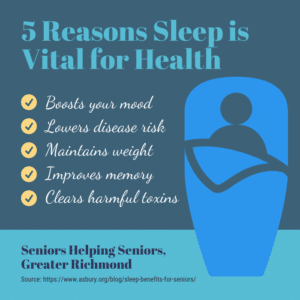 Many people have a love-hate relationship with sleep. When you were a child, you probably fought it and said that you’d stay up as late as you wanted when you grew up. As adults, we wish we could go back and sleep that much again. While sleep helps health at any age, its importance only increases as we get older. Senior sleep quality plays a vital part in a senior’s overall health, both physical and mental.
Many people have a love-hate relationship with sleep. When you were a child, you probably fought it and said that you’d stay up as late as you wanted when you grew up. As adults, we wish we could go back and sleep that much again. While sleep helps health at any age, its importance only increases as we get older. Senior sleep quality plays a vital part in a senior’s overall health, both physical and mental.
The Importance of Sleep
As a person ages, quality of sleep becomes increasingly important. Having a good night’s sleep makes us feel refreshed and ready to tackle the day, but it gives us other benefits, as well. These include:
- Boosting your mood
- Lowering risk of disease
- Maintaining healthy weight and supporting metabolism
- Improving concentration and memory
- Clearing your body of harmful toxins
Effects of Poor Senior Sleep Quality
Effects on Physical Health
The national sleep foundation recommends that adults over age 65 should get 7-8 hours of sleep per night. Even though most adults know that they should sleep this much each night, many still have trouble reaching that goal. Unfortunately, the centers for disease control links insomnia to increased chance of high blood pressure and heart disease. Problems in these areas affect overall health and can carry over to other areas of health, as well. According to Better Health While Aging, almost a quarter of older adults report symptoms of insomnia. Since many seniors hesitate to discuss these symptoms with their doctors, one can assume that number to be even higher.
Effects on Mental Health
In addition to its effects on physical health, poor senior sleep quality has a negative effect on mental health. Issues with insomnia can cause or worsen depression in older adults. Feelings of hopelessness from depression then make it harder for a person to fall asleep, causing an unfortunate cycle that reduces health and quality of life. The senior then continues to withdraw from others and activities, making the problem even worse.
Improving Senior Sleep Quality
What can seniors do to improve quality of sleep? This help guide offers several tips. First, you must understand that sleep changes as we age. Your body is not the same as it was when you were younger, and that’s ok. Since you no longer produce growth hormone, you likely experience a decrease in deep sleep. You can counteract this by going to sleep earlier or taking a short nap during the day.
Another way to combat insomnia is to get to the root of its cause. Increased stress, depression, anxiety, recent trauma or life changes, and medications can all lead to difficulty sleeping. It’s important for seniors to advocate for themselves with their doctors and ask for help identifying any issues that may affect sleep.
Other ways to achieve better sleep include:
- Making sure your room is dark and a comfortable temperature
- Getting enough exercise during the day (but not too close to bedtime)
- Eating a balanced diet
- Maintaining a consistent bedtime and sleep schedule
We cannot stress enough the importance of communicating sleep problems with your doctor. Sleep affects every other aspect of life, and you should not ignore issues with it. Talk to a family member or medical professional for help!


